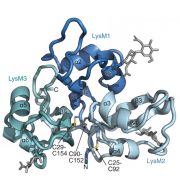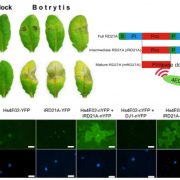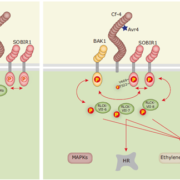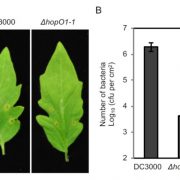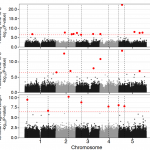Review: Age is NOT just a number (Trends Plant Sci)
Aging of plants is marked by the growth and differentiation of individual organs, as well as transitions of the whole plant through developmental phases: juvenile, vegetative adult, and reproductive phase. 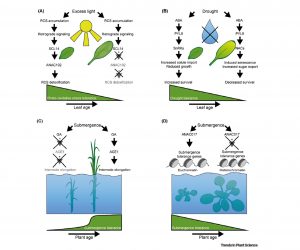 In their recent review, Rankenberg et al. discuss how abiotic stress responses vary in plants with their age. Spatiotemporally regulated and meticulously coordinated action of several proteins and miRNAs orchestrate the organ development and phase transitions in plants. In addition to the morphological and anatomical changes, aging also drives changes in the biochemistry of leaves, especially redox homeostasis, hormonal levels, and source-sink balance. These changes, together with the changes in multiple signaling pathways contribute to the age-related differences in the ability of plants to cope up with abiotic stress conditions. In general, the resilience against challenging environmental conditions such as excessive light, drought, salinity, and water-logging is gradually compromised with increasing age. This is primarily because of the failure to activate the signaling pathways that regulate the mechanisms of ROS detoxification, stress-induced senescence, and morphological plasticity, which collectively ensure better adaptation to abiotic stress. The authors conclude by strongly advocating the inclusion of developmental age as an integral component of abiotic stress research in the future. (Summary by Yadukrishnan Premachandran @yadukrishprem) Trends Plant Sci. 10.1016/j.tplants.2020.12.016
In their recent review, Rankenberg et al. discuss how abiotic stress responses vary in plants with their age. Spatiotemporally regulated and meticulously coordinated action of several proteins and miRNAs orchestrate the organ development and phase transitions in plants. In addition to the morphological and anatomical changes, aging also drives changes in the biochemistry of leaves, especially redox homeostasis, hormonal levels, and source-sink balance. These changes, together with the changes in multiple signaling pathways contribute to the age-related differences in the ability of plants to cope up with abiotic stress conditions. In general, the resilience against challenging environmental conditions such as excessive light, drought, salinity, and water-logging is gradually compromised with increasing age. This is primarily because of the failure to activate the signaling pathways that regulate the mechanisms of ROS detoxification, stress-induced senescence, and morphological plasticity, which collectively ensure better adaptation to abiotic stress. The authors conclude by strongly advocating the inclusion of developmental age as an integral component of abiotic stress research in the future. (Summary by Yadukrishnan Premachandran @yadukrishprem) Trends Plant Sci. 10.1016/j.tplants.2020.12.016


